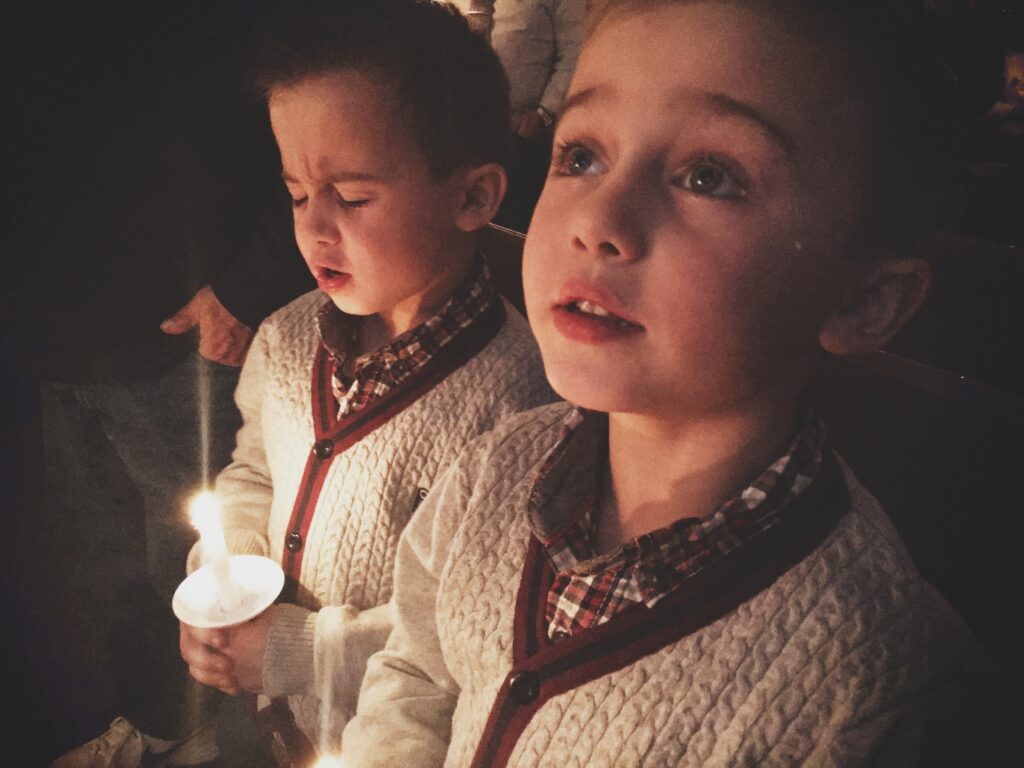Holiday
Autism and Santa Claus
Benefits of Believing
Allowing a child with autism to believe in Santa Claus can have several potential benefits, just as it can for neurotypical children. It’s essential to consider the individual needs and preferences of the child in question. Here are some positives to teaching your child with autism about Santa Claus:

Imagination and Creativity
Believing in Santa Claus can foster imaginative thinking and creativity in children with autism. Many individuals with autism have vivid imaginations and enjoy engaging in imaginative play. The concept of Santa Claus and the magical world associated with him can provide an outlet for creative expression.

Social Connection
Belief in Santa Claus is a widespread cultural phenomenon, and many children, both neurodivergent and neurotypical, participate in discussions and activities related to Santa during the holiday season. Encouraging a child's belief in Santa can help them feel a sense of connection with their peers and engage in shared experiences, such as talking about gifts and holiday traditions.

Emotional Development
The belief in Santa Claus can contribute to the development of various emotions and social skills. For example, it can help children with autism understand concepts like empathy, gratitude, and giving. Writing letters to Santa, leaving out milk and cookies, or participating in gift-giving can promote emotional engagement and social interaction.

Routine and Predictability
Individuals with autism often thrive on routine and predictability. The anticipation and structure associated with Santa Claus, such as writing letters, leaving out snacks, and opening presents on Christmas morning, can provide a structured framework within which they can feel comfortable and secure during a potentially chaotic holiday season.

Joy and Wonder
Believing in Santa Claus can bring a sense of joy, wonder, and excitement to a child's life, enhancing their overall enjoyment of the holiday season. This can be particularly meaningful for children with autism, as they may have specific interests or intense focus on particular topics, and Santa can become a source of fascination and delight.
Respecting Their Unique Needs
Every child is unique, and their preferences and sensitivities may differ. Some children with autism may not be interested in or may struggle with the concept of Santa Claus. As a parent or caregiver, it’s crucial to respect their individual needs and preferences and make adjustments accordingly. Always prioritize the well-being and comfort of the child in your decision-making.
Consider how your child reacts to different things. Children with autism can have strong reactions to certain sensations. Santa Claus involves surprises, loud noises, and unfamiliar people, which might overwhelm your child. Sitting on Santa’s lap at the mall, for instance, might be way too much for some children to handle. If you think these things might bother your child, it’s okay to skip Santa Claus.
Children with autism often think in a very literal way. Some kids might find it confusing or upsetting to believe in Santa Claus and later discover that he’s not real. If your child takes things very seriously, it might be better not to introduce the idea of Santa Claus.

Consider Interests
Think about what your child is interested in. Children with autism often have intense interests. If your child is not interested in or doesn’t understand Santa Claus, it might be more enjoyable to focus on activities and traditions that they do like.

Beliefs & Values
Consider your family’s beliefs and values. Every family is different, and you might have your own ideas about what you want to celebrate during the holidays. Some families like the excitement and magic of Santa Claus, while others focus on different parts of the holiday season. It’s important to choose what feels right for your family.

Handling Belief In Later Stages
Handling a situation where a child with autism continues to believe in Santa Claus beyond what is considered the typical age can be a sensitive matter. Here are some friendly suggestions on how to approach and handle this situation respectfully and effectively:

Understand the Context
It's important to recognize that children with autism may have different cognitive and social development paths. Their beliefs and understanding of abstract concepts like Santa Claus may differ from their neurotypical peers. Keep in mind that children with autism often have unique perspectives and experiences.

Respect Their Beliefs
Honor and respect the child's belief in Santa Claus. Understand that it might bring them comfort, joy, and a sense of wonder. Allow them to enjoy the experience as long as it doesn't negatively impact their overall well-being or social interactions.

Assess the Impact
Consider the potential consequences of their belief in Santa Claus. If their belief is causing distress, confusion, or social challenges, it might be worth gently addressing the issue.
Choose an Appropriate Time and Setting
Find a calm and comfortable environment to discuss the topic with the child. Avoid confrontational or public settings that might increase their anxiety or embarrassment.
Visual Aids & Social Stories
Children with autism often respond well to visual cues and social stories. Create a personalized visual guide or story that explains the concept of Santa Claus, focusing on the historical and symbolic aspects. This can help them transition from a literal belief to a more abstract understanding.
Provide Alternative Explanations
Introduce the idea that Santa Claus represents the spirit of giving, kindness, and the joy of the holiday season. Emphasize that while Santa Claus might not be a literal person, the values associated with him continue to inspire people to spread happiness and generosity.
Validate Their Feelings
Acknowledge any disappointment or confusion they might experience when confronted with the reality of Santa Claus. Offer comfort, understanding, and reassurance that their feelings are valid.
Focus on New Traditions
Help the child explore and establish new holiday traditions that align with their interests and abilities. Encourage them to participate in activities they enjoy, such as making crafts, baking, or giving presents to others.
Involve Support Network
Coordinate with parents, teachers, therapists, or other professionals involved in the child's life to ensure consistent messaging and support. Collaborate with them to create an individualized plan that respects the child's needs and developmental stage.

Be Patient & Understanding
Every child is unique, and it may take time for them to adjust to the new understanding of Santa Claus. Show patience, understanding, and support throughout the process. Remember, the goal is to help the child navigate their beliefs in a way that promotes their well-being and social integration while respecting their individuality and unique cognitive profile.
Guide Disclaimer
The information provided in this article is intended for general informational purposes only and should not be considered as professional advice or a substitute for medical, therapeutic, or educational guidance. Every child’s needs are unique, and what works for one child may not work for another. It is essential to consult with qualified professionals, such as doctors, psychologists, therapists, or educators, who can provide individualized recommendations and support tailored to your child’s specific needs.


